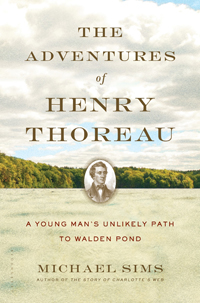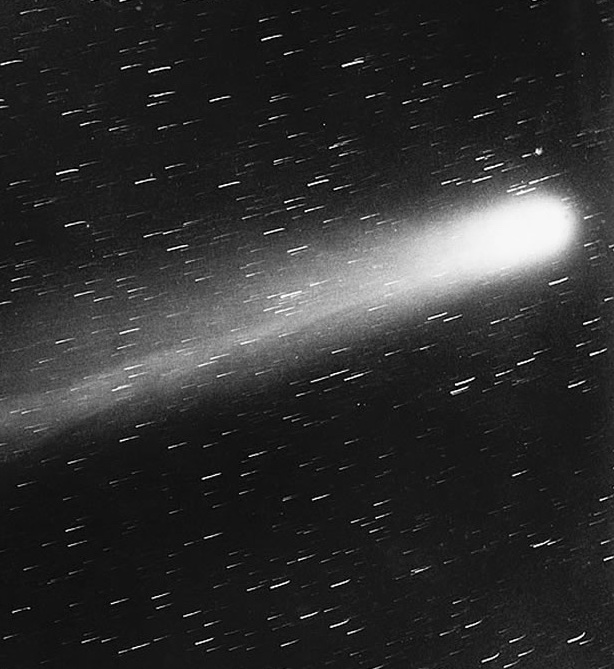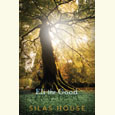The Cost of a Thing
Decades after first reading Walden, Michael Sims still finds Henry David Thoreau exciting and challenging, maddening and inspiring
I think I may be allergic to mottoes. The idea that you can boil life down to a bumper-sticker philosophy seems childish to me. And I think people who try to squeeze themselves into a labeled philosophy look as if their underwear is too tight. Although now and then I read a line that truly changes the way I think about something, there has been only one sentence from a book that seemed to cast ripples across my decades on this busy little planet. Eventually it changed the direction of my life.
 That line would be this part of a sentence from Henry David Thoreau’s pellucid, nourishing, gnarly, quarrelsome masterpiece, Walden: “[T]he cost of a thing is the amount of what I will call life which is required to be exchanged for it, immediately or in the long run.” It’s from the opening chapter, “Economy.” Although I’m not certain, I think I first met Thoreau in Hal Borland’s 1969 anthology, Our Natural World, which I checked out many times from the Art Circle Public Library in Crossville, Tennessee. I was eleven when it was published, which fits my idea that I met Thoreau in my early teens.
That line would be this part of a sentence from Henry David Thoreau’s pellucid, nourishing, gnarly, quarrelsome masterpiece, Walden: “[T]he cost of a thing is the amount of what I will call life which is required to be exchanged for it, immediately or in the long run.” It’s from the opening chapter, “Economy.” Although I’m not certain, I think I first met Thoreau in Hal Borland’s 1969 anthology, Our Natural World, which I checked out many times from the Art Circle Public Library in Crossville, Tennessee. I was eleven when it was published, which fits my idea that I met Thoreau in my early teens.
As I walked each spring at my own little pond amid hundreds of acres of woods, about half a mile behind our house on the Cumberland Plateau, I thought not only of Thoreau’s descriptions of nature but of his troublesome call to arms: What does it cost? The question still rings through my days. The only currency I’m really interested in is my limited time on Earth—which, in economic terms, has no income, only outgo. I’m always asking, “How much of my life will X cost?” Although I’ve sometimes had an earning problem, I’ve seldom had a spending problem. I knew early on that the world offered few temptations I coveted as much as I yearned to write books, so I tried to arrange a life that would buy me time to write. I suspected that I would have to write a lot of crap before I wrote anything good and that it would take decades to build a career. I was right on both points.
My wife, Laura, has a question she asks herself when she sees people behaving in a self-destructive manner: “Wouldn’t therapy be cheaper?” Among family and friends and acquaintances and strangers and celebrities, I see the costs of alcoholism, narcissism, and other demons, and I think, “Are these choices really worth what they will cost you in the long run?” Thoreau seems an unlikely psychological counselor, I admit, but I’m not the first person to find himself treating the tiny Walden cabin as a therapist’s couch.
 I grew up in rural Tennessee. There were no bookstores in Crossville, the nearest town, but Homestead Elementary School and Cumberland County High School both had a little library, and Crossville had the Art Circle Public Library, each one populated by patient and enthusiastic librarians. I raced into them as if they were doorways to another world, and I smile just remembering them—oh my, the late golden afternoon light splashing across those old bookshelves. And each month, my teacher at Homestead would unpack a box of mail-ordered Scholastic Book Club paperbacks—books that stand within reach of my desk at this moment as touchstones, with titles such as The Great Whales or Mystery of the Haunted Hut. No Christmas will ever top the monthly anticipation of watching from my desk as the teacher took handfuls of books out of the box, matched them with their order slips, and called out our names. I can recall the giddy anticipation right now. I learned early on that a new book might turn out to be a magic carpet to another world.
I grew up in rural Tennessee. There were no bookstores in Crossville, the nearest town, but Homestead Elementary School and Cumberland County High School both had a little library, and Crossville had the Art Circle Public Library, each one populated by patient and enthusiastic librarians. I raced into them as if they were doorways to another world, and I smile just remembering them—oh my, the late golden afternoon light splashing across those old bookshelves. And each month, my teacher at Homestead would unpack a box of mail-ordered Scholastic Book Club paperbacks—books that stand within reach of my desk at this moment as touchstones, with titles such as The Great Whales or Mystery of the Haunted Hut. No Christmas will ever top the monthly anticipation of watching from my desk as the teacher took handfuls of books out of the box, matched them with their order slips, and called out our names. I can recall the giddy anticipation right now. I learned early on that a new book might turn out to be a magic carpet to another world.
When I first read Thoreau a few years later, I quickly realized that I had found a magic carpet to my own world. Henry helped me see and hear and smell my own woodland paths, and my own pond, with fresh senses. He brought a deeply poetic sensibility and a fine education to bear on observing the passenger pigeon and red squirrel, and I tried to apply his way of looking to my own rose-breasted grosbeaks and box turtles. The point at which Thoreau began to disappoint Emerson—when he began to focus on the reality of the individual creature and not on its symbolic import—is the point at which he becomes one of my household gods.
And Thoreau guided my critique of the society in which I found myself—small-town fundamentalism carefully contorting around its own contradictions, the casual conformities Thoreau so despised, the emphasis on another world to come rather than the heaven we have been given here, the slammed door of “That’s just how it is.” Decades ago a girlfriend remarked that I might consider working up a more mature philosophy than merely “Says who?” But after I read Thoreau, “Says who?” always seemed a good starting point.
As the author of a recent book on Thoreau myself, I feel I ought to try to say something useful about him, about his writing. I’ve given up hope of ever being profound, but I try to be useful in my nonfiction books. Yet as I write this, I seem unable to think of Thoreau in any terms beyond the personal. I’ve used up the scholarly, and what I have left is only What Henry Means to Me. I know that I love his writing more than I would have loved him. Although he was loyal to his friends and utterly devoted to his family, Henry was not easy to know then, and he is not easy to read now. “A sanctimonious beatnik,” P. J. O’Rourke called him, and I can’t help but nod and laugh.
 I turn most often to Thoreau’s journal, which has far more delight in than critique of the world. A few years ago, my wife gave me Dover’s two fat volumes of the journal. Each giant page includes four pages of the original 1906 edition of that two-million-word masterpiece. It is not a book you can read in bed. But slowly I add to its weight with endless underlining and note-taking. Glancing at it now, I notice that there are childlike question marks and exclamation points in my notes. Decades after he first sneaked into my life through an anthology at the public library, I still find Thoreau exciting and challenging, maddening and inspiring.
I turn most often to Thoreau’s journal, which has far more delight in than critique of the world. A few years ago, my wife gave me Dover’s two fat volumes of the journal. Each giant page includes four pages of the original 1906 edition of that two-million-word masterpiece. It is not a book you can read in bed. But slowly I add to its weight with endless underlining and note-taking. Glancing at it now, I notice that there are childlike question marks and exclamation points in my notes. Decades after he first sneaked into my life through an anthology at the public library, I still find Thoreau exciting and challenging, maddening and inspiring.
On the sagging shelf beside those Dover volumes stands The Annotated “Walden,” with countless informative and entertaining annotations by Philip Van Doren Stern. My scribble on the flyleaf reminds me that I found the book on a bookstore sale table in late November 1978, and my note adds, “from myself, for Xmas.” I was twenty. What Van Doren Stern’s introduction and annotations gave me was a glimpse of the Thoreau that Thoreau himself left out of the carefully constructed, semi-fictional narrator of Walden—a lonely, bustling, insecure, young man who could fix a stove or build a boat and could read Pindar and Marcus Aurelius, Goethe and Rousseau, in the original. This glimpse started me on the road that led, thirty-six years later, to the publication this year of my own book on Thoreau—my attempt to resurrect the young man Henry before he evolved into the icon Thoreau. (Van Doren Stern’s was my second annotated classic, the first being William S. Baring-Gould’s two-volume Annotated Sherlock Holmes, which has led, in an incubation lasting since 1973, to my book about the origins of Sherlock Holmes, in progress now and due to be published in late 2015. That one will have taken forty-two years. I hate to rush.)
I signed the contract for my Thoreau book in early 2012 and worked on it throughout Laura’s pregnancy that year. For four nights in February 2013, Laura and I were in Magee-Womens Hospital in Pittsburgh, where she was going through a difficult labor and delivering our son, Vance. Every time I walked down the hall I saw in huge letters on a wall a line from Thoreau: “Every child begins the world again.” It’s part of a sentence in Walden—a sentence I underlined in Van Doren Stern’s edition thirty-six years ago. Vance has indeed made my world new, made the earth itself seem newly minted and dewy with promise. I wrote a good bit of my Thoreau book while holding him in my lap. A few weeks ago I stood beside Walden Pond at dawn, with the cabin site behind me, and I admit I whispered, “Thank you.”
Now, in August 2014, we celebrate the 160th anniversary of Walden. The world first met this outrageous, wonderful book on the ninth of the month, when it was published by Boston’s young firm of Ticknor and Fields—the first publisher, incidentally, to pay royalties to foreign authors rather than merely pirating their work. George William Curtis, a young near-Transcendentalist who knew Thoreau, later remarked that Ticknor and Fields “compelled the world to acknowledge that there was an American literature.” Little did they know that one of their first books would redirect and come to symbolize American literature of the era. Ernest Hemingway claimed that all of American fiction grew from Huckleberry Finn. It seems to me that a vast amount of American nonfiction—and nonfiction writing in general, whether about nature or society—grew from Walden. As did the nonviolent movements of Gandhi and Martin Luther King, as both made clear in their writings and speeches.
“To Boston,” Thoreau noted laconically in his journal on that fateful day. “Walden published.” Then he went on to make natural history notes in his own shorthand: “Elder-berries XXX. Waxwork yellowing X.” I like revisiting that passage. There he is again, responding to the world, trying to communicate, and creating his own language.
[The essay appeared originally on August 18, 2014. It has been updated to reflect new event information.]

Copyright (c) 2014 by Michael Sims. All rights reserved. Michael Sims is the author of six books of nonfiction, including The Adventures of Henry Thoreau, and the editor of six anthologies. The Phantom Coach: A Connoisseur’s Collection of Victorian Ghost Stories, will be published on August 26, 2014.


